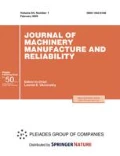Abstract
Numerous experimental works concerning the comparative analysis of heat transfer processes in hydrogen and gasoline engines have confirmed the noticeable increase in heat loss in the case of applying hydrogen. Without denying the influence of higher values of the flame propagation velocity and the hydrogen combustion temperature contributing to intensification of the convective heat transfer in the combustion chamber, the present article shows that, when using hydrogen as a fuel, the main problem consists in penetration of the flame into the gap between the heat belt of the piston and the sleeve. We analyze this phenomenon using the flame extinguishing theory by Ya.B. Zeldovich. On the base of the unsteady heat flux measurements in the gap, as well as of 3D simulation of both the thermophysical processes in the combustion chamber and the thermal state of the piston of the experimental gasoline engine converted to hydrogen, we explain the phenomenon of relative increase in heat losses in the hydrogen engine, its existence previously having been shown experimentally without theoretical justification.





Similar content being viewed by others
REFERENCES
Kozlov, S.I. and Fateev, V.N., Vodorodnaya energetika: sovremennoe sostoyanie, problemy, perspektivy (Hydrogen Power Engineering: Modern State, Problems, Perspectives), Velikhov, E.P., Ed., Moscow: Gazprom VNIIGAZ, 2009.
Kavtaradze, R., Natriashvili, T., and Gladyshev, S., Hydrogen-diesel engine: problems and prospects of improving the working process, Technical Paper of Society of Automotive Engineers, 2019, no. 2019-01-0541. https://doi.org/10.4271/2019-01-0541
Cernat, A., Pana, C., Negurescu, N., Lazaroiu, G., Nutu, C., and Fuiorescu, D., Hydrogen—an alternative fuel for automotive diesel engines used in transportation, Sustainability, 2020, no. 12, p. 9321. https://doi.org/10.3390/su12229321
Babayev, R., Andersson, A., Dalmau, A.S., Im, H.G., and Johansson, B., Computational characterization of hydrogen direct injection and nonpremixed combustion in a compression-ignition engine, Int. J. Hydrogen Energy, 2021, vol. 46, no. 35, pp. 18678–18696. https://doi.org/10.1016/j.ijhydene.2021.02.223
Shudo, T. and Suzuki, H., Applicability of heat transfer equations to hydrogen combustion, JSAE Rev., 2002, vol. 23, no. 3, pp. 303–308. https://doi.org/10.1016/S0389-4304(02)00193-5
Shudo, T., Improving thermal efficiency by reducing cooling losses in hydrogen combustion engines, Int. J. Hydrogen Energy, 2007, vol. 32, no. 17, pp. 4285–4293. https://doi.org/10.1016/j.ijhydene.2007.06.002
Laiminger, St., Url, M., Payrhuber, K., and Schneider, M., Wasserstoff für Gasmotoren – Kraftstoff der Zukunft, Motortech. Z., 2020, vol. 81, no. 5, pp. 66–71. https://doi.org/10.1007/s35146-020-0221-0
Cech, M., Knape, M., Wilfert, T., and Reiser, Ch., Der abgasfreie Wasserstoff-Kreislaufmotor, Motortech. Z., 2021, vol. 82, no. 4, pp. 44–49. https://doi.org/10.1007/s35146-021-0645-1
Bobusch, B., Ebert, T., Fink, A., and Nett, O., Düse zur oszillierenden Direkteinblasung im H2-Verbrennungsmotor, Motortech. Z., 2021, vol. 82, nos. 7–8, pp. 42–47. https://doi.org/10.1007/s35146-021-0686-5
Koch, D.T., Eßer, E., Kureti, S., and Sousa, A., H2-DeNOx-Katalysator für H2-Verbrennungsmotoren, Motortech. Z., 2020, vol. 81, no. 6, pp. 32–39. https://doi.org/10.1007/s35146-020-0234-8
Duan, J., Liu, F., and Sun, B., Backfire control and power enhancement of a hydrogen internal combustion engine, Int. J. Hydrogen Energy, 2014, vol. 39, no. 9, pp. 4581–4589. https://doi.org/10.1016/j.ijhydene.2013.12.175
Mishchenko, A.I., Primenenie vodoroda dlya avtomobil’nykh dvigatelei (Application of Hydrogen for Automotive Engines), Kiev: Naukova Dumka, 1984.
Merker, G., Schwarz, Ch., Stiesch, G., and Otto, F., Verbrennungsmotoren: Simulation der Verbrennung und Schadstoffbildung, Stuttgart: Teubner, 2006, 3rd ed.
Zeldovich, Ya.B., Theory of the propagation limit of still flame, Izbrannye trudy. Khimicheskaya fizika i gidrodinamika (Ya. B. Zeldovich. Selected Works. Chemical Physics and Hydrodynamics), Moscow: Nauka, 1984.
Kavtaradze, R.Z., Lokal’nyi teploobmen v porshnevykh dvigatelyakh (Local Heat Transfer in Piston Engines), Moscow: Mosk. Gos. Tekh. Univ. Baumana, 2016, 3rd ed.
Rosenberger, M., Dellner, M., Kluge, M., and Tarantik, K.R., Fahrzeugintegration eines thermoelektrischen generators, Motortech. Z., 2016, vol. 77, no. 4, pp. 38–45. https://doi.org/10.1007/s35146-016-0006-7
Author information
Authors and Affiliations
Corresponding author
Ethics declarations
The authors declare that they have no conflicts of interest.
Additional information
Translated by I. Dikhter
About this article
Cite this article
Kavtaradze, R.Z., Onischenko, D.O., Golosov, A.S. et al. The Influence of the “Piston Heat Belt–Sleeve” Gap on Heat Exchange in the Combustion Chamber of an Engine Depending on the Fuel Utilized. J. Mach. Manuf. Reliab. 51, 112–120 (2022). https://doi.org/10.3103/S1052618822010046
Received:
Revised:
Accepted:
Published:
Issue Date:
DOI: https://doi.org/10.3103/S1052618822010046



